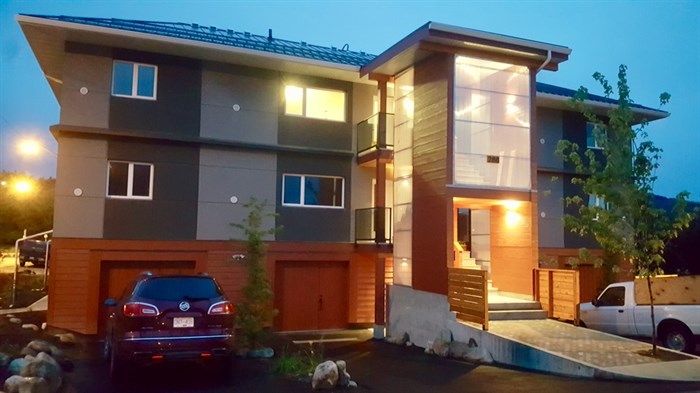
The home built by Nexbuild sits on the corner of Shubert Drive and Larch Avenue.
Image Credit: SUBMITTED- Miles Pruden
September 03, 2019 - 6:00 AM
KAMLOOPS - A Kamloops man who has been living in what he says is a groundbreaking eco-friendly home is now reaping the financial benefits of going greener.
Miles Pruden, the owner of Nexbuild, had worked for 10 years toward his goal of creating a house that utilizes renewable energy and prioritizes efficiency and last June he, his family and three other families moved into the four-unit building on the north shore.
“Almost everything we've done, something at least somewhat similar has been done before. But the whole package of what we've put together, I don't think anyone in the world has done it before,” Pruden says.
He says that the three other families, who own their respective units, have seen a drastic reduction in their energy bills, with some of them getting money back from B.C. Hydro. He says this is just the start of his plan to make environmentally friendly homes more accessible and affordable.
“When you finish the year having produced more power over the last few billing cycles, then B.C. Hydro writes you a check,” Pruden says.
“If we can build a house that doesn't cost more than a traditional house and operating costs are far lower, then in my experience, that's a product people are going to want to have.”
Pruden says that he was inspired to take on the challenge because of the lack of housing options for those looking to live with a lighter footprint.
“I figured we should be able to build more affordable housing and more sustainable housing,” Pruden says. “I’m trying to do it myself so I can prove that it’s effective, and I expect it to get more effective with every iteration… everything I build will be like this, and it'll get better every time.”
The build wasn’t without challenges, and Pruden said he turned to YouTube and other online resources to find ways to bring his vision to fruition. Pruden identified issues in the current solar heat collection methods and worked on finding a solution.
“The problem with conducting sunlight directly to heat is you can collect a lot of heat that way, but you don't get to choose when you collect it. So in a regular house, it'll overheat the building,” Pruden says.
Pruden set about finding a way to fix the problem, which he accomplished through creating a DIY device and equipping the home with sensors. Pruden says there are various other methods in place at the building which allows it to run in an energy-efficient way, such as collecting the heat from used shower water, utilizing nighttime air to cool the house, and using photovoltaic cell solar panels to provide electricity.
Pruden hopes that this house will become a learning tool and a model for his future builds. He plans to have a permanent crew who are familiar with the new technologies, eventually creating a streamlined approach to building this way. He says information from the Intergovernmental Panel on Climate Change inspired him to work on creating a healthier world for his family and others.
“We want to make sustainable homes available to everybody, not just really rich people who have the luxury of paying ten or 20 per cent extra on their home,” Pruden says. “We all have a very serious problem, including myself personally. If the world isn't going to fix this problem, then I have to do it.”
— This story was corrected at 9:01 a.m., Tuesday, September 3, 2019, to clarify that the three families living in the home are owners, not tenants.
To contact a reporter for this story, email Jenna Wheeler or call (250) 819-6089 or email the editor. You can also submit photos, videos or news tips to the newsroom and be entered to win a monthly prize draw.
We welcome your comments and opinions on our stories but play nice. We won't censor or delete comments unless they contain off-topic statements or links, unnecessary vulgarity, false facts, spam or obviously fake profiles. If you have any concerns about what you see in comments, email the editor in the link above.
News from © iNFOnews, 2019